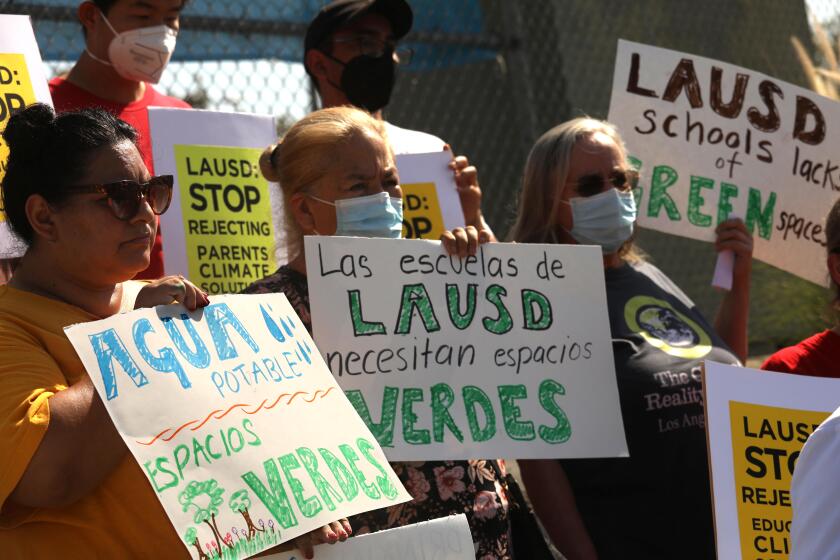Congress fiddles while the West burns
- Share via
Imagine a 55-mile-long lake that starts in the Sierras and ends in the wine country of Paso Robles, or, for an even more precise description, picture a lake with the Alps at one end and Tuscany at the other. That would be Lake Chelan, a glacial fjord that carves its way out of the Cascade Mountains and flows into the dry vineyard-and-orchard-wrapped terrain of eastern Washington state.
Lake Chelan is where my family has vacationed nearly every summer for a quarter century, but I’ve never written about it, not wanting to encourage even more tourists to swamp the place. The secret is out, though. If you checked the top news in the Los Angeles Times or watched any national news reports last month, you will have seen images of Lake Chelan with houses along the shore — and even boats and docks — burned to charred ruins. You will have seen thick smoke choking the air and blocking the normally blue sky.
For a number of days, the town of Chelan at the dry end of the long lake was the epicenter of a huge wildfire, one of many that made this the worst fire season in Washington’s history (the previous record for worst was set only last year). There were dozens of other major fires in California, Oregon, Idaho and other parts of the West and many of them — including the conflagration near Chelan — have yet to be fully contained. As Gov. Jerry Brown has observed, there is not a fire “season” anymore; thanks to climate change, wildfires are becoming a year-round phenomenon.
At one point, when it seemed half the country was going up in smoke, the folks fighting the flames around Chelan called for reinforcements and there were none to be found. All available firefighting crews were already in burning woodlands scattered throughout several states. To meet the need for more able hands, Washington Gov. Jay Inslee called up the National Guard, then asked for citizen volunteers who were willing to be trained on the job.
Not only has manpower been stretched to the limit and beyond during this year’s wildfire war, but the budget of the U.S. Forest Service has been drained by the endless fight. And, guess what? It is only going to get worse as rising global temperatures continue to dry out millions of acres of forest.
The good news is that there are mitigation and prevention efforts that could help the problem. Over the last five years, the federal Collaborative Forest Landscape Restoration Program has diminished the likelihood of massive fires on 1.43 million acres. Better management of forests, including controlled burns and the removal of dry underbrush and insect-damaged trees, could do even more. The bad news is that the Forest Service does not have enough money to carry through with these measures because all the money is being spent fighting fires. In other words, they cannot pay for preventing fires because they are busting the budget trying to put out the ones that are burning.
There is a way to fix the funding problem. Wildfires are clearly natural disasters, just like hurricanes, floods and tornadoes. If the costs of fighting wildfires were charged to FEMA, the federal agency tasked with handling big disastrous events, the Forest Service could use its money the way it was intended — managing the forests. There is only one thing standing in the way of that logical policy: America’s do-nothing lawmakers.
Congress has, for years, failed to give the Forest Service enough money to do its job. A new Wildlife Disaster Funding Act has languished while our senators and representatives have been busy doing as little as possible about most of the problems facing the nation. It isn’t just partisan gridlock that has prevented action. Narrow-visioned budget hawks have failed to see that a miserly approach to the Forest Service budget actually costs the country more money as preventable wildfires go unchecked and the economies of the western states get hit over and over. The climate change deniers in Congress add to the problem by refusing to recognize that wildfires are one of many challenges that must be addressed as environmental realities shift.
Wildfires are burning homes, destroying natural resources and habitats, wrecking vacation areas, hurting rural communities, threatening agricultural economies and taking lives, including those of three firefighters who were brought down by a blaze north of Chelan. It may be too great a stretch to say members of Congress have blood on their hands, but if they fail to act before another summer of burning begins, they will certainly share a big part of the blame for the tragic results.
More to Read
A cure for the common opinion
Get thought-provoking perspectives with our weekly newsletter.
You may occasionally receive promotional content from the Los Angeles Times.










